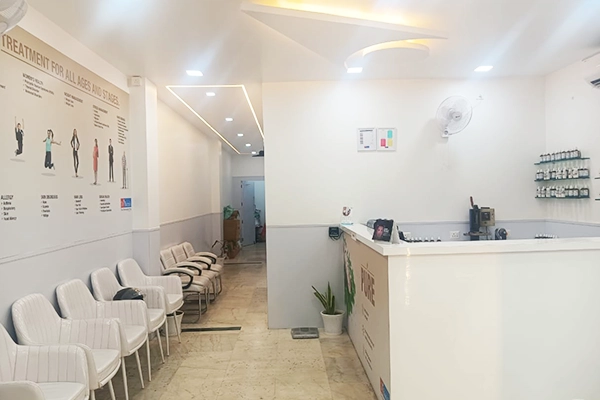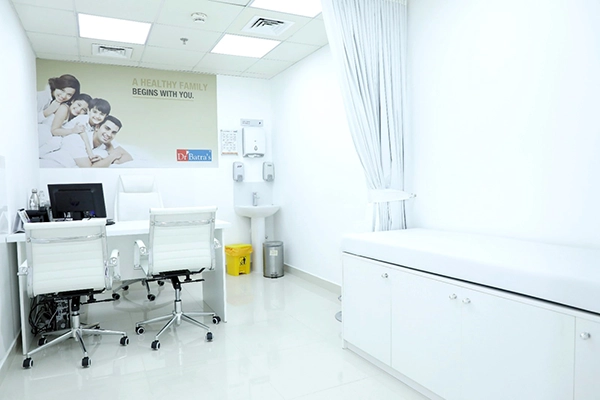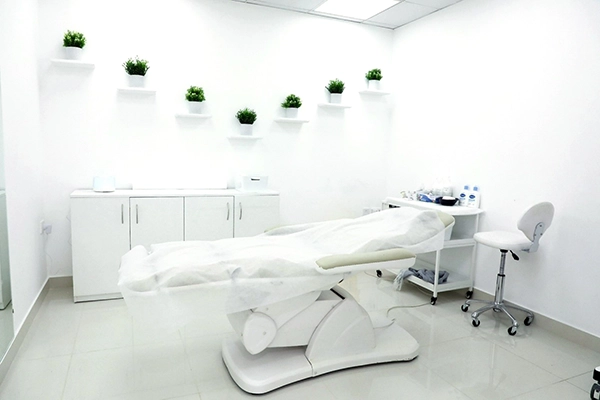Urinary Incontinence Homeopathic Treatment in Dubai, UAE
Urinary incontinence is not only a physical issue but can also affect an individual's emotional well-being and social life. Despite its prevalence, many people avoid seeking treatment due to the stigma surrounding the condition.
It is important to recognize that urinary incontinence can be managed effectively with appropriate care, and understanding its underlying causes is essential for tailoring the right treatment.
The findings of the study underscore the importance of early intervention and effective management strategies, such as homeopathy, to help alleviate symptoms and improve quality of life.
According to a study published on PubMed, urinary incontinence is a highly prevalent condition that can significantly impact an individual's quality of life. This condition involves the involuntary loss of urine, which can range from occasional leaks to more frequent and severe episodes.
The study highlights that in the United Arab Emirates (UAE), approximately 42.2% of women experience some form of urinary incontinence, with the average onset occurring at the age of 37.8 years.
This condition is often associated with social embarrassment, discomfort, and increased mental stress, making it a challenge for many individuals to maintain normal daily activities.
Why Choose Dr Batra's® for Urinary Incontinence Homeopathy Treatment in Dubai?
- Global Trust and Expertise: Dr Batra's® has a long-standing reputation for excellence in homeopathic care, with over four decades of experience in treating urinary incontinence and other related conditions. With thousands of cases successfully treated globally, Dr Batra's® is one of the most trusted names in homeopathy.
- Expert Care: Our team of experienced homeopaths works to understand the specific causes and symptoms of your urinary incontinence, crafting a treatment plan tailored to your unique needs. We aim to address the underlying factors contributing to your condition.
- Customized Treatment Plans: Every patient's case is different. At Dr Batra's®, we offer personalized treatment plans that are designed to work specifically for your body's needs, taking into account your symptoms, lifestyle, and overall health.
- Proven Results: Over the years, Dr Batra's® clinics have helped numerous patients regain control over their bladder health and improve their quality of life. Our treatment approach is backed by positive patient testimonials and success stories. Many patients have reported significant relief from urinary incontinence after undergoing homeopathic treatment.
- Convenient Locations: Dr Batra's® clinics are located across Dubai and Abu Dhabi, providing accessible treatment options for residents across the UAE. Our clinic locations include:
Get Urinary incontinence Treatment at Conveniently Located Clinics in Dubai & Abu Dhabi





Our Treatment Process for Urinary Incontinence at Dr Batra's® Clinics in UAE
- Personalized Consultation: The first step in our treatment process is a comprehensive consultation, where we thoroughly assess your symptoms, medical history, and lifestyle. We gather detailed information to understand the root cause of your urinary incontinence.
- Advanced Homeopathic Treatment: Based on your consultation, our experts design a personalized homeopathic remedy plan. Homeopathy aims to stimulate your body's natural healing process, addressing not only the symptoms but also the underlying causes of urinary incontinence.
- Holistic Approach: In addition to homeopathic treatment, we provide lifestyle and dietary recommendations to further enhance your bladder health. Our holistic approach ensures long-term improvement and addresses all aspects of your health.
- Proven Results: Our treatments have helped thousands of patients improve their quality of life. We closely monitor your progress and adjust treatment plans as needed, ensuring that our homeopathic remedies provide the best possible outcomes.
Urinary Incontinence
The condition can lead to significant social embarrassment, discomfort, and mental stress, making it essential to seek early diagnosis and treatment. Additionally, urinary incontinence can impact your daily activities, causing a sense of insecurity and anxiety in public spaces.
Urinary incontinence can be categorized into different types based on its cause and symptomatology. The severity of incontinence varies, with some individuals experiencing occasional leaks and others struggling with complete bladder control loss.
It's important to address the condition promptly with a proper treatment strategy to prevent further complications and improve the patient's overall well-being.
Types of Urinary Incontinence
There are several types of urinary incontinence, each with different causes and symptoms. Here's a brief overview of each type:
- Stress Incontinence: This occurs when physical activities like coughing, sneezing, laughing, or lifting heavy objects put pressure on the bladder, causing leakage.
- Urge Incontinence: Characterized by a sudden, intense need to urinate, followed by an involuntary release of urine before reaching the restroom.
- Overflow Incontinence: This type occurs when the bladder is unable to empty completely, leading to frequent dribbling of urine or a constant sensation of fullness in the bladder.
- Functional Incontinence: This occurs due to physical or cognitive limitations, which prevent an individual from reaching the restroom in time. This can be seen in individuals with disabilities or conditions such as dementia.
- Mixed Incontinence: A combination of two or more of the above types of incontinence, often seen when stress and urge incontinence occur together.
Each type requires a different treatment approach, and Dr Batra's® homeopathic remedies are tailored to suit the specific type of urinary incontinence a patient is experiencing.
Causes of Urinary Incontinence
Urinary incontinence can be triggered by several factors, some of which are temporary, while others may be chronic. Here are some common causes of incontinence:
- Weak Bladder Muscles or Pelvic Floor Dysfunction: Weakness in the pelvic muscles or bladder muscles can lead to poor bladder control. This is particularly common in women after childbirth or those experiencing pelvic floor dysfunction.
- Pregnancy & Childbirth: Women often experience urinary incontinence after childbirth due to stretched and weakened pelvic muscles. The hormonal changes during pregnancy may also affect bladder function.
- Aging & Hormonal Changes: With age, the muscles that support the bladder may weaken. Hormonal changes, particularly during menopause, can also lead to an increase in urinary urgency or incontinence.
- Prostate Issues: In men, prostate enlargement or prostate surgery can disrupt bladder function and contribute to incontinence.
- Urinary Tract Infections (UTIs): UTIs can irritate the bladder, causing symptoms such as frequent urination and a sudden need to urinate.
- Neurological Disorders: Conditions like Parkinson's disease, multiple sclerosis, and stroke can impact the nerves that control bladder function, leading to incontinence.
- Side Effects of Medications: Some medications, especially diuretics and certain types of antidepressants, can increase the risk of urinary incontinence. Additionally, caffeine, alcohol, and obesity may contribute to bladder dysfunction.
Urinary Incontinence - Symptoms
Urinary incontinence refers to the involuntary leakage of urine and can present in several different forms, each with its own set of symptoms:
- Stress Incontinence: This type of incontinence occurs when there is a sudden increase in abdominal pressure, which puts strain on the bladder. This can happen when:
- Coughing
- Sneezing
- Laughing
- Exercising (especially activities like running, jumping, or weightlifting)
- Dancing
- Swimming
- In these situations, the bladder may not be able to hold urine, leading to leakage.
- Urge Incontinence: This is characterized by a sudden, intense urge to urinate that is difficult to control. It can happen due to an overactive bladder or sensitivity in the bladder. Symptoms of urge incontinence include:
- A strong, urgent need to urinate, even with a small amount of urine in the bladder.
- Increased frequency of urination, often more than 8 to 10 times per day.
- The urge to urinate may occur even at the sound of running water or the mere thought of using the bathroom.
- Some medications can also trigger this type of incontinence.
- Overflow Incontinence: This occurs when the bladder fails to empty completely, causing urine to leak slowly or dribble out. This can happen when the bladder becomes overly full, and the person is unable to control the release of urine.
It is important to note that some individuals may experience one or more of these types of urinary incontinence simultaneously, leading to a combination of symptoms.
Complications of Urinary Incontinence
In addition to the physical discomfort and inconvenience, urinary incontinence can also lead to several complications, both physical and emotional:
Physical Complications:
- Skin Irritation and Infection: The constant leakage of urine can lead to skin problems such as rashes, boils, and infections, particularly in the genital and perineal areas due to constant moisture.
- Urinary Tract Infections (UTIs): The increased risk of UTIs is common in individuals with urinary incontinence, which can lead to recurring infections and fever.
- Obesity: Lack of physical activity, often due to the fear of leakage during exercise, can contribute to weight gain and obesity.
- Unpleasant Odor: The leakage of urine can cause an unpleasant odor, which can be socially and emotionally distressing.
- Hygiene Challenges: Maintaining proper hygiene can become more difficult, and individuals may need to use absorbent products, which can lead to skin irritation.
- Sleep Disturbances: The need to frequently wake up to urinate at night (nocturia) can disturb sleep patterns, leading to fatigue and reduced quality of life.
Emotional Complications:
- Low Self-Image: The embarrassment and frustration caused by urinary incontinence can lead to a diminished sense of self-esteem and body image.
- Emotional and Social Isolation: Many people with urinary incontinence avoid social gatherings, public places, or outings with friends and family due to the fear of accidents, which can lead to feelings of isolation.
- Relationship Issues: Incontinence can affect relationships, especially if there is a lack of understanding or open communication between partners. This can lead to emotional distance and stress within the relationship.
- Depression: The physical and emotional challenges associated with urinary incontinence can significantly impact one's quality of life, leading to feelings of sadness, frustration, and even depression.
Urinary Incontinence - Diagnosis
At Dr Batra's®, we understand that discussing urinary incontinence can be a sensitive topic, especially for female patients who may feel uncomfortable speaking to a male homeopath. To ensure a comfortable and understanding environment, we offer consultations with female homeopaths who specialize in treating this condition.
The process for diagnosing urinary incontinence includes the following steps:
- Initial Consultation: Our homeopaths will begin by asking detailed questions about your symptoms, including the frequency, type, and triggers of incontinence. They will also explore the emotional and social challenges you may be experiencing due to this condition.
- Medical Assessment: A thorough medical assessment and clinical examination will be conducted to better understand the progression and severity of your condition. This will help determine the best course of action for treatment.
- Diagnosis and Prognosis: The homeopath will evaluate your condition's diagnosis, likely prognosis, and potential outcomes. They will consider the impact on your daily life and develop a personalized treatment plan accordingly.
- Stage-Based Treatment Plan: The homeopathy treatment approach will be tailored to your specific stage of incontinence, taking into account whether you are in the early stages or experiencing more advanced symptoms.
- Comprehensive Health Review: If necessary, the homeopath will also inquire about any other health conditions you may have that could be contributing to your urinary incontinence.
- Second Opinion: In cases where there is uncertainty or a need for further clarification, we may recommend a second opinion to ensure the most accurate diagnosis and treatment plan.
Lifestyle & Dietary Tips for Managing Urinary Incontinence
In addition to homeopathic treatment, adopting certain lifestyle changes can greatly improve symptoms. Below are a few tips to help manage urinary incontinence:
- Kegel Exercises to Strengthen Pelvic Muscles: Kegel exercises can help tighten and strengthen the pelvic floor muscles, improving bladder control. Research indicates that these exercises can be highly effective for managing stress incontinence
- Avoid Bladder Irritants: Reduce or eliminate bladder irritants like caffeine, alcohol, and spicy foods, which can trigger or worsen incontinence symptoms.
- Maintain a Healthy Weight: Carrying excess weight places additional pressure on the bladder, exacerbating incontinence. A balanced diet and regular exercise can help maintain an optimal weight.
- Timed Voiding Techniques: Regularly scheduled bathroom breaks can help prevent accidents by training the bladder to empty at set times.
- Hydration Balance: Proper hydration is essential, but avoiding excessive fluid intake can prevent bladder overactivity and frequent urges.
- Dietary Changes: Eating a diet rich in fiber can help prevent constipation, which can worsen incontinence by adding pressure on the bladder. Additionally, including foods high in magnesium and antioxidants may support bladder health.
Book Your Appointment to Get Relief from Urinary Incontinence
If you're struggling with urinary incontinence and are looking for a natural, effective treatment, Dr Batra's® Homeopathic clinics in Dubai and Abu Dhabi are here to help.
Our holistic and personalized approach to urinary incontinence is designed to provide lasting relief. Book your consultation today, and let us help you regain control and improve your quality of life with expert homeopathic care. Visit one of our convenient clinic locations in the UAE today!
Myths and Facts
1. Smaller bladders are prone to urinary incontinence.
Urinary incontinence is due to weak muscles, infection or nerve damage and has nothing to do with the size of the bladder.
2. Only old people can get it.
Urinary incontinence can affect people of any age from 18 to 80 years. Furthermore, obesity, chronic cough or any medical condition exerting pressure over the bladder can lead to urinary incontinence.
3. Drinking less water will help deal with urinary incontinence.
Urinary incontinence is a medical illness, which needs timely and corrective action, else it can lead to complications
4. Urinary incontinence is just something you have to live with.
Urinary incontinence is treatable.
5. Holding urine for long can lead to incontinence.
Holding urine has no relation to incontinence, unless you are suffering from urinary tract infection, which may lead to incontinence.
FAQs
I noticed that soon after childbirth, I sometimes end up leaking urine while I cough or sneeze. Can it be treated?
Yes. It is a common condition seen in most women after childbirth. It affects mothers who had a vaginal delivery, which is responsible for the weakness of pelvic muscles and bladder control. It resolves easily with strengthening exercises of the buttock muscles. You may consult our doctors and learn about Kegel exercises that will help attain bladder control. If it still continues, you may need further evaluation.
I am 21 years old. Recently I noticed that whenever I twist or turn my body, I leak some amount of urine. Is there any way to prevent my condition?
Yes. Even though you are too young to suffer from weak bladder control, identifying and treating it early will bring about better results. Do consult our doctors for further evaluation.
I am gaining weight rapidly. But I am unable to exercise because physical exercise weakens my bladder control. Can you help me?
You probably suffer from stress incontinence, and exercising does make the symptoms worse. At the same time, weight gain can worsen your symptoms. You need to train your pelvic muscles to minimize stress incontinence. In addition, get medical help to identify and treat underlying medical conditions if any.



